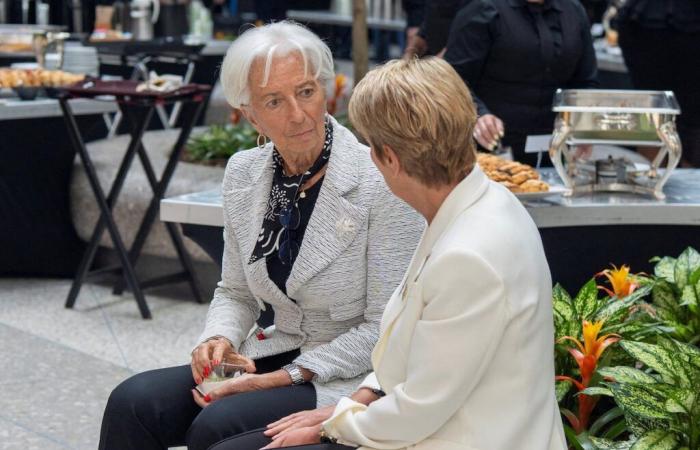The International Monetary Fund (IMF) believes that the European central Bank (ECB) should only lower one more step in the relaxation of monetary policy. With unusual precision, the organism that directed a few years ago Christine Lagarde marks the path to which she is now president of the ECB. “Monetary policy must continue to be agile and focused on achieving the objectives in a lasting manner. We recommend that the ECB reduce the official interest rate at 2% this summer and keep it at that level, unless important disturbances occur,” said Friday at Washington Alfed Kammer, director of the Department of the Fund for Europe.
The ECB has undertaken seven discounts of 0.25 points from 4% to which the price of money was in June last year to the current 2.25%. Lagarde left the door open to the possibility of a new cut at the meeting on June 5 (the last spring meeting, actually), although he pointed out that he would make his decision based on the data and events that occur until then.
The commercial war declared by the president of the United States, Donald Trump, and his erratic changes of seeming have stopped world growth and altered the road map of the central banks, which is about to be defined.
“Inflation rates are now close to the objectives. After the enormous success of the BCE deflation stresses, central banks must continue to normalize monetary policy with caution. World tensions could cause a new rebound in inflation expectations, although a deeper economic recession in Europe would exert the low pressure,” Kammer said when presenting the IMF report on Europe.
While in the United States, the impression that the commercial war will raise prices and inflation expectations predominates, the European situation is different. “Nothing is clear what the net impact will be,” he said this week in Washington Lagarde in an event held in parallel to the meetings of the IMF and the World Bank. “In particular, if Europe does not decide to adopt countermeasures, I think that net inflation is uncertain at this time, but it will probably be more uninflationary than inflationary,” he argued. “It is difficult to evaluate because we are in a world of hypothesis, we are in a transition period in which we do not know exactly what will come out of the discussions that are being carried out at this time, and we also have to be cautious,” he added.
In its spring forecasts, the IMF has reduced its growth forecast of the euro zone economy from 1.0% to 0.8%. According to Kammer, the reduction would have been greater if it is not for compensatory factors. The economist highlights the infrastructure package of 500,000 million euros in Germany and the increase in defense expenditure throughout Europe. The impact of this additional expense on the growth of the euro zone between 0.1 and 0.2 percentage points of GDP in 2025 and 2026.
In any case, he warns that the risks to growth are down, since commercial tensions and uncertainty could be further aggravated. Financial conditions could also harden. A greater fiscal relaxation due to the increase in defense expenditure and the decrease in energy prices, on the other hand, could cause greater growth, especially beyond 2025.
The IMF considers it essential for Europa to preserve commercial opening and continue expanding its network of free trade agreements. Ask to monitor the impact of a possible deviation from commerce, with an increase in Chinese imports by drying the trade of the Asian giant with the United States for high tariffs. “Our preliminary estimates point to an increase in imports from China of around 0.25 % of the EU of the EU in the short term. Trade deviation would probably also reduce the costs of inputs for European companies and prices for consumers,” according to Kammer.
Regarding public accounts, Kammer indicates that for most countries, the reconstruction of fiscal mattresses remains a priority. “Those who have low deficits and debt can temporarily accommodate the priority expenditure in defense, but they will have to return to the objectives of sustainability of the debt over time. Countries with high levels of debt must reallocate the expense or increase fiscal income without delay,” reiterates the message already launched by the IMF this week.
Growth recipes
The IMF anticipates the publication of reports with recommendations to European countries to boost growth. One of them will focus on the benefits of greater integration and another on internal reforms. “The integration potential is immense,” says Kammer. According to the work that will be published soon, a series of “selected and viable reforms at the EU level could increase EU GDP around 3 % during the next decade”. Among the key areas that must be improved are the reduction of barriers to labor mobility, the improvement of the operation of capital markets, the creation of a more integrated electricity market and the harmonization of laws and regulations.
As for the “integral national reforms” that identifies in another next report, they could increase real GDP levels around 5% in advanced Europe. “These reforms would eliminate internal inefficiencies and complement EU’s scale reforms. The greatest profits would come from the improvement of workers’ competences and the functioning of labor markets. In most advanced European economies, national reforms should also focus on promoting innovation,” according to Kammer.






